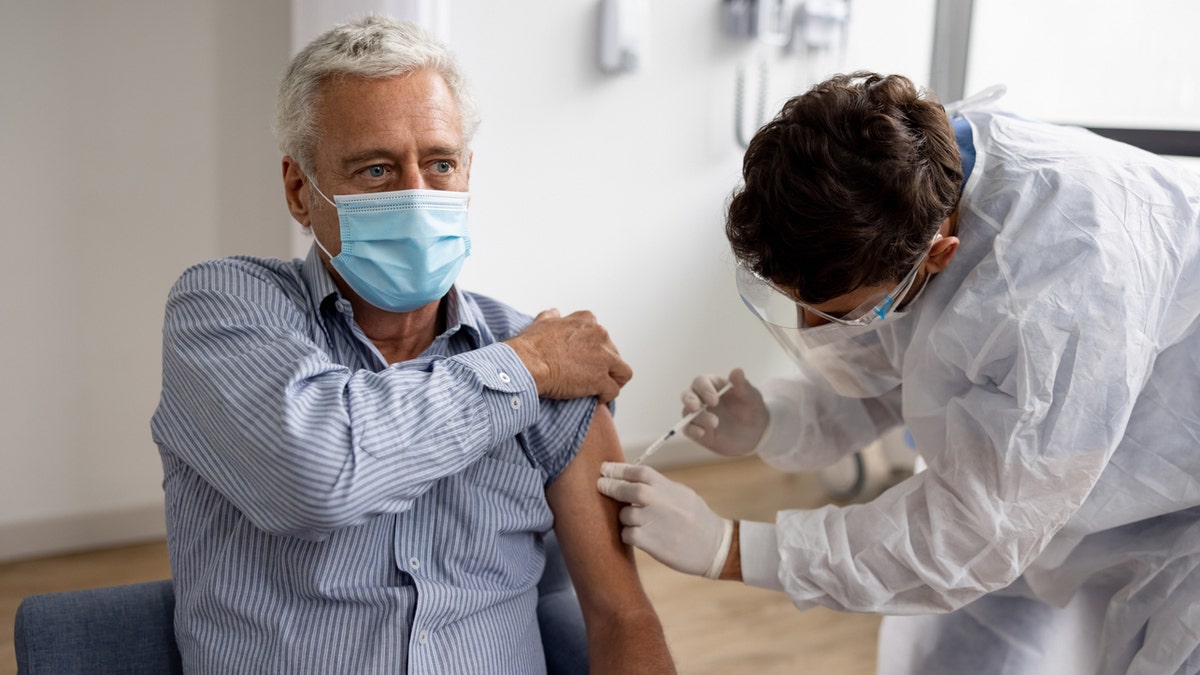New Alzheimer's drug pending FDA approval
Chief Washington correspondent Mike Emanuel reports the latest on the new Alzheimer's drug.
Getting vaccinated against shingles, pneumonia and other illnesses could potentially reduce adults’ risk of developing Alzheimer’s disease, according to a new study from the University of Texas Health Science Center at Houston.
Researchers found that people who received shingles and pneumonia vaccines — along with tetanus and diphtheria — had as much as a 30% reduced risk of developing Alzheimer’s, the most common type of dementia.
The study was recently published online in the Journal of Alzheimer’s Disease.
Those who received the Tdap vaccine for tetanus, diphtheria and pertussis were 30% less likely to get Alzheimer’s.
Patients who received the pneumococcal vaccine — which protects against the bacteria that can lead to pneumonia, meningitis and sepsis — demonstrated a 27% lower chance of having an Alzheimer’s diagnosis.

Getting vaccinated against shingles, pneumonia and other illnesses could potentially reduce the risk for adults of developing Alzheimer’s disease, according to a new study. (iStock)
The shingles vaccine was linked to a 25% reduced risk, the study found.
The researchers followed patients who were at least 65 years old at the start of the eight-year study period and did not have dementia in the prior two years.
LOSS OF SMELL COULD BE WARNING SIGN FOR FUTURE ALZHEIMER’S DISEASE, RESEARCHERS SAY
They compared groups of vaccinated and unvaccinated patients for each of the vaccines, looking at the occurrence of Alzheimer’s diagnoses.
A little over a year ago, the same research team published another study that showed people who got at least one influenza vaccine showed a 40% lower rate of Alzheimer’s than their unvaccinated peers, the press release stated.

More than six million people in the U.S. are living with Alzheimer's disease, according to the Alzheimer’s Association. (iStock)
"We were wondering whether the influenza finding was specific to the flu vaccine," said senior author Paul E. Schulz, who is the Umphrey Family Professor in Neurodegenerative Diseases and director of the Neurocognitive Disorders Center at McGovern Medical School, in a press release from the University of Texas.
DEMENTIA PATIENTS WHO TAKE OPIOIDS FACE 'WORRISOME' DEATH RISK, NEW STUDY FINDS
"This data revealed that several additional adult vaccines were also associated with a reduction in the risk of Alzheimer’s," he added.

"This effect is likely the result of a heightened immune response to amyloid plaques or their upstream precursors," Dr. Brett Osborn of Florida told Fox News Digital. (Dr. Brett Osborn)
Dr. Brett Osborn, a board-certified neurosurgeon in West Palm Beach, Florida, who also runs an anti-aging facility called Senolytix, was not involved in the study but reviewed the findings.
"This must be studied carefully, but there is a growing body of evidence that regular vaccines are associated with decreased Alzheimer’s risk."
"This effect is likely the result of a heightened immune response to amyloid plaques or their upstream precursors," he told Fox News Digital.
"In essence, immune system surveillance – toward amyloid — has improved, potentially as a result of the vaccine, thereby improving amyloid clearance from the brain," he went on.
"This improved scavenging would directly limit amyloid buildup and potentially slow the onset of the disease."
As people age, Osborn said, their immune systems begin to weaken, making them more susceptible to cancers and infections.
"Bottom line, we are less capable of ‘scanning our insides’ for aberrant cells (or infectious pathogens) as we get older," Osborn said.
"In this case, these vaccines, despite their non-specificity for amyloid plaques, are altering the state of our immune system, giving it a much-welcomed boost, at least as far as Alzheimer’s disease is concerned."
He added, "So, is this a cheap, unintentional and inexpensive version of immunotherapy? That remains to be seen."
TALK THERAPY? AI MAY DETECT 'EARLIEST SYMPTOMS' OF DEMENTIA BY ANALYZING SPEECH PATTERNS
Dr. Marc Siegel, a professor of medicine at NYU Langone Medical Center and a Fox News medical contributor, agreed that this study shows an association but does not prove that the vaccines reduce risk.
"This must be studied carefully, but there is a growing body of evidence that regular vaccines are associated with decreased Alzheimer’s risk," he said.

Researchers found that people who received certain shingles and pneumonia vaccines — along with tetanus and diphtheria — had up to a 30% reduced risk of developing Alzheimer’s. (iStock)
"I believe this is due to ‘priming the pump,’ meaning that a healthy immune system that is already alert for viruses due to the vaccines we take can also target neuro-inflammation and abnormal proteins that lead to Alzheimer's," Siegel said.
The study authors believe that these findings support the importance of adults having access to vaccinations as a more cost-effective means of preventing dementia.
"Is this a cheap, unintentional and inexpensive version of immunotherapy? That remains to be seen."
"Over the last couple of years, the field of Alzheimer’s disease has vastly expanded, especially with the recent approval of anti-amyloid antibody medications by the FDA," said co-first author Kristofer Harris, program manager in the Department of Neurology with McGovern Medical School at UTHealth Houston, in the press release.

"Adult vaccinations are widely available and are already routinely administered as part of a vaccination schedule," said the first co-author of the new study. (iStock)
"However, those medications require costly infrastructure in order to be administered safely," Harris added.
"Conversely, adult vaccinations are widely available and are already routinely administered as part of a vaccination schedule."
CLICK HERE TO SIGN UP FOR OUR HEALTH NEWSLETTER
More than six million people in the U.S. are living with Alzheimer's disease, according to the Alzheimer’s Association.
CLICK HERE TO GET THE FOX NEWS APP
Nearly 13 million Americans are expected to be diagnosed with the illness by 2050.












































